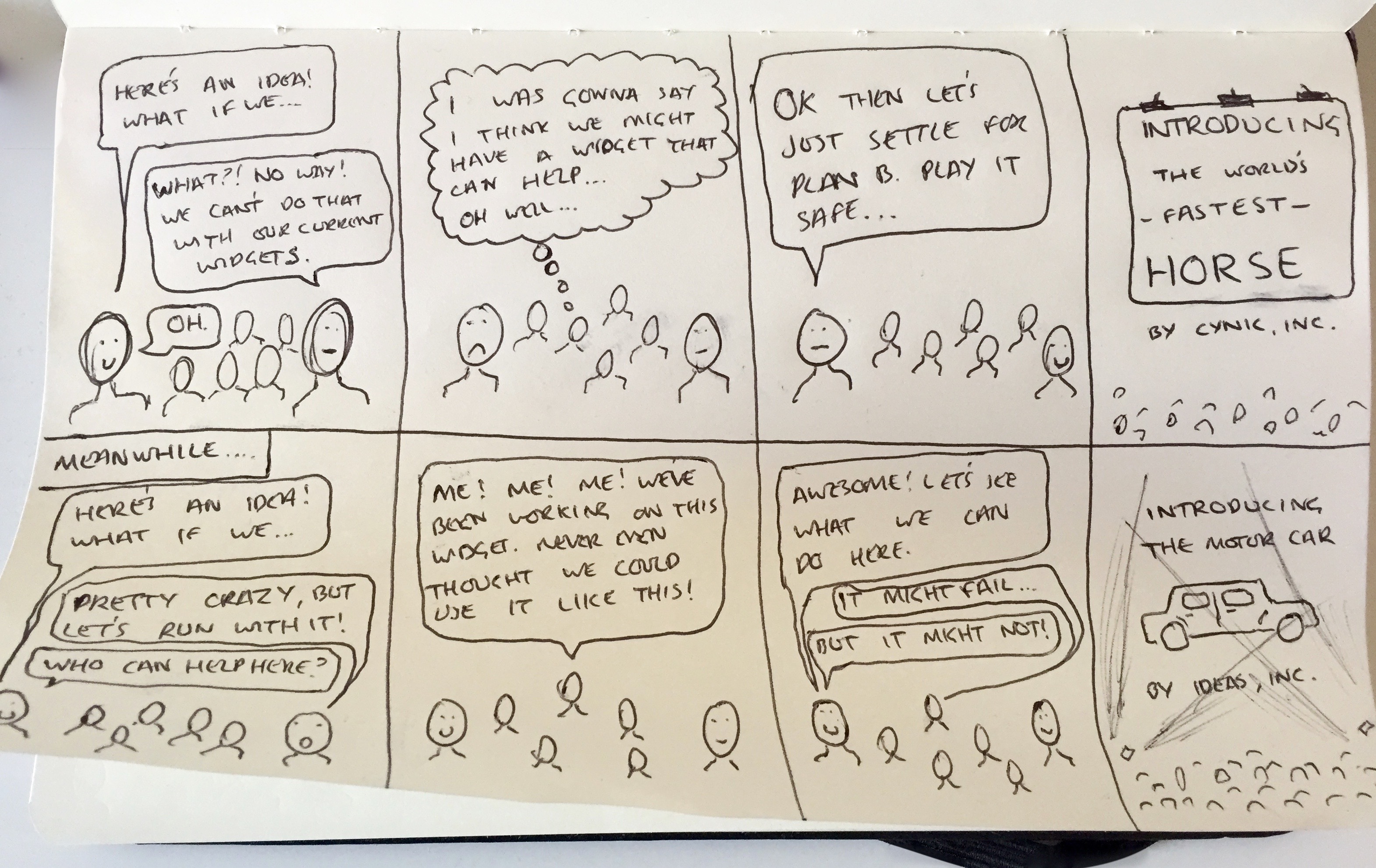Ideas are fragile
Steve used to say to me — and he used to say this a lot — “Hey Jony, here’s a dopey idea.”
And sometimes they were. Really dopey. Sometimes they were truly dreadful. But sometimes they took the air from the room and they left us both completely silent. Bold, crazy, magnificent ideas. Or quiet simple ones, which in their subtlety, their detail, they were utterly profound.
And just as Steve loved ideas, and loved making stuff, he treated the process of creativity with a rare and a wonderful reverence. You see, I think he better than anyone understood that while ideas ultimately can be so powerful, they begin as fragile, barely formed thoughts, so easily missed, so easily compromised, so easily just squished."
– Jony Ive
There's no room for cynicism in a creative team.
Shooting down ideas can't happen at the start of a creative process.
When you're trying to build things that don't yet exist – when you're trying to do creative work – there are always people who will tell you it can't be done.
There are also people who figure out a way it can be done. Usually both those sets of people are correct. The cynics move onto a different idea, the rest let the idea run.
Every significant invention has looked impossible up until the moment it's made possible.
It's fine to have cynics on the outside. In fact, there's often nothing better to spur you on than to have cynical competitors, or customers telling you "it can never be done!" from the outside.
But on your team – the people coming together to put new things into the world – you have to aggressively reject cynicism. It's a poison that will destroy the creativity of your team. And a team without creativity is a team headed for failure.
Ideas eventually need to be narrowed down and focused. Ideas eventually need to be carefully prioritised and broken apart into achievable steps that can be implemented and built. But in many teams, and in many creative processes, the implementation steps come far too soon and limit the possibility of producing a truly different or unique result.
To illustrate
Apologies – all I had was a Moleskine and an iPhone. And a pen, of course.

Encouraging creativity
The key goal for us is to ensure everyone on the team, no matter who they are or what position they're in, feels free to share their ideas with everyone.
No one should ever ever feel worse off for having shared their idea with the team.
It might sound obvious, but it's incredible how many teams unintentionally punish the creators of ideas with the feedback that is given to them. It's far too easy to spot the issues, the problems, the reasons why it can't be done. The reasons why it'll be impossible with the current team, technology, budget or resources.
A few steps we're taking to ensure no one ever regrets sharing an idea with the team:
- Start with yes. Think "Yes this idea can be done, how do we do it?"
- Work hard to find something positive to say about the idea, even if your gut is only finding negatives.
- Put yourself in the shoes of the person who's just shared their idea – how would you want to receive constructive criticism?
- Are the negatives in the idea worth conveying in front of the whole team, or one-to-one?
- Think what you can do to turn the idea from a barely formed thought into a real thing.
- Give more time to sharing ideas as a team. Don't try to shoehorn creative discussion into existing meetings that serve a different purpose. Find ways you can spend time as a team sharing ideas in a relaxed atmosphere with less of a time constraint.
- Don't laugh. There are plenty of things to laugh at in this world. Other people's creative endeavours are not on the list.
Don't let creativity lose to cynicism. Fight for it. Start with yes. Hear people out. Don't be short sighted. Don't let ideas get squished. Defend creativity and fight for open idea sharing in your team, or else prepare to fail. There's plenty of time to figure out what's impossible later.
